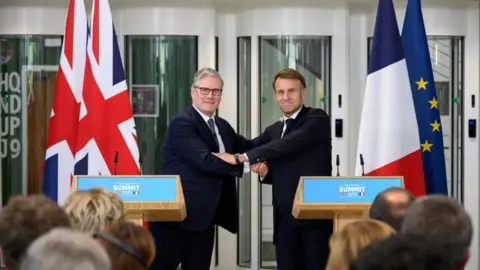UK-France Migrant Deal: “Robust” and Ready for Legal Scrutiny, Says Home Secretary
UK-France Migrant Deal: “Robust” and Ready for Legal Scrutiny, Says Home Secretary
The United Kingdom’s new migrant cooperation agreement with France, which establishes a “one in, one out” system for individuals crossing the English Channel, has been declared “robust” enough to withstand potential legal challenges, according to the UK Home Secretary. This significant development comes as both nations aim to tackle the ongoing challenge of illegal migration and small boat crossings.

The Home Secretary has been in close communication with various European governments, many of whom have expressed interest and support for the new accord. The European Union has reportedly been “very supportive and helpful” in the formation of this agreement, signaling a potentially unified approach to migration management across the continent.
The government has emphasized that extensive work has been undertaken to ensure the legality and resilience of the scheme against potential court challenges. This proactive measure is seen as a crucial lesson learned from previous attempts to deport illegal migrants, which were hampered by legal obstacles. The previous government’s efforts to deport individuals to Rwanda, for instance, faced significant legal battles that ultimately stalled the program.
However, the plan has faced criticism. Shadow Home Secretary Chris Philp has characterized the agreement, which anticipates the return of approximately 50 migrants per week to France, as a mere “gimmick.” He expressed skepticism about its effectiveness in curbing illegal crossings and addressing the broader migration crisis.
Key Details of the Migrant Deal
The newly signed agreement, a collaborative effort between UK Prime Minister Sir Keir Starmer and French President Emmanuel Macron, stipulates that the UK will return migrants who arrive via small boats back to France. This initiative is set to commence as a pilot program.

The core of the pilot program is the “one in, one out” exchange: for every migrant the UK repatriates to France, the UK will, in turn, accept another individual who has already made a legal asylum claim in France. Both nations believe this reciprocal arrangement will serve as a significant deterrent to illegal Channel crossings.
While specific figures for the exchange remain undisclosed, it is anticipated that the pilot phase will involve around 50 migrants weekly. The government has committed to providing updates on these numbers as the pilot progresses.
Complementing the return scheme, the UK government plans to intensify efforts to identify and penalize those working illegally within the UK. The Home Secretary highlighted that illegal employment acts as a significant “pull factor” encouraging individuals to undertake dangerous Channel crossings.
In instances where a returned migrant attempts to cross the Channel again, the Home Secretary clarified that they would be subject to further returns and potentially banned from the UK’s asylum system. This strict policy aims to discourage repeat attempts.
Conversely, critics like Chris Philp have labelled the entire initiative as another “gimmick,” arguing that it fails to address the root causes of migration and will permit the majority of illegal migrants to remain in the UK. He further criticized Sir Keir Starmer’s decision to abandon the previous government’s Rwanda plan, calling it a “catastrophic mistake” and contrasting it with the Rwanda scheme’s goal of “100% of illegal arrivals being removed.”
The Home Secretary countered these criticisms by stating that only four migrants had ever been voluntarily sent to Rwanda under the previous administration’s plan, which she characterized as “chaos.” Official figures indicate that since 2018, when data collection began, over 170,000 individuals have arrived in the UK via small boats. The current year has seen record numbers, with nearly 20,000 arrivals in the first six months of 2025 alone.
French President Emmanuel Macron has stated that the new agreement is expected to have a “deterrent effect” that extends beyond the direct numbers of returned migrants. He also suggested that the UK’s departure from the European Union may have added complexities to its ability to effectively manage illegal migration.



Post Comment